Dirty air unsafe at any level for seniors
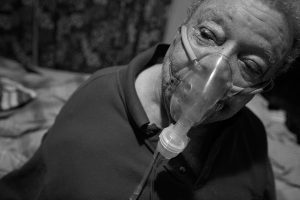
The U.S. government considers acceptable occasional days with high levels of fine particulate air pollution (PM2.5) and ozone—as long as the yearly average stays within safety standards (12 μg/ m3 per day). But for the elderly—especially those who are low-income, female, or black—these high-pollution days can be deadly. According to a study published in December 2017 in JAMA, senior author Francesca Dominici, professor of biostatistics and co-director of the Harvard Data Science Initiative, and colleagues found that an increase of just 1 microgram per cubic meter of air (µg/m3) in daily PM2.5 over the course of one summer in the U.S. would lead to 550 extra deaths per year. “The mortality rate increases almost linearly as air pollution increases,” says Dominici. “Any level of air pollution, no matter how low, is harmful to human health.”
Leveraging Design Thinking for Public Health
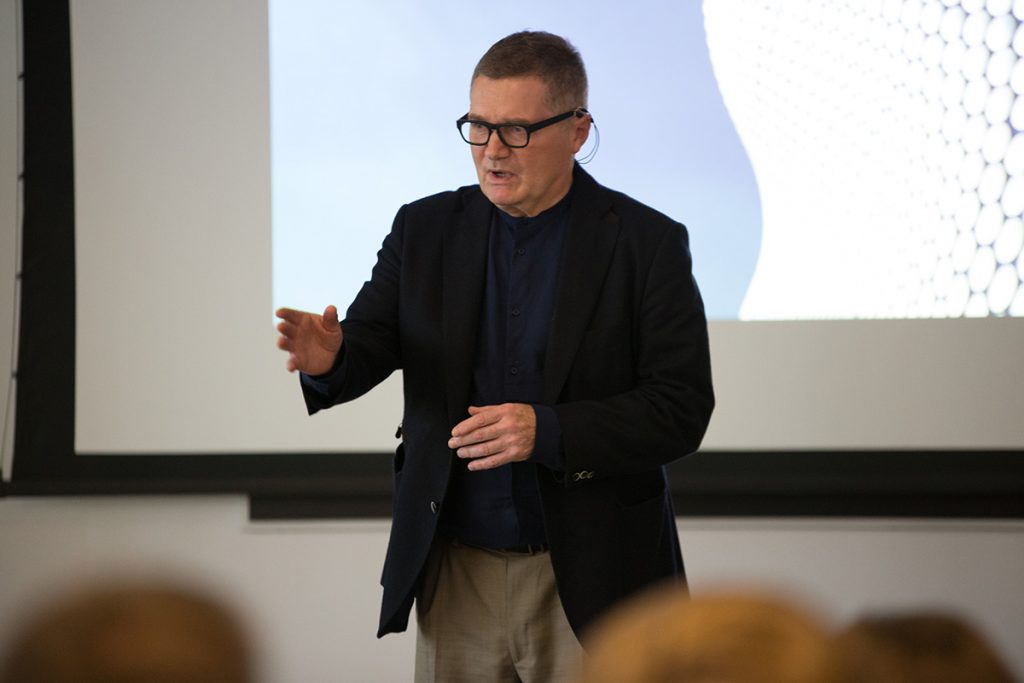
Students from the Harvard Chan School and across the University came together at the Harvard i-lab over the fall semester for the new course Design of Social Innovation. While some may have thought of “design” as the process of creating a building or smartphone, by the end of the course, they realized that they could use design to tackle large, ill-defined problems in public health. Visiting professor Patrick Whitney (above), one of the foremost experts on the discipline of design as an approach to solving complex human problems, taught students new ways to approach public health challenges—as a supplement to standard science-based approaches—when information is incomplete and fast-changing. As a case study, students designed solutions to help the World Health Organization (WHO) more effectively manage disease outbreaks, including a smartphone interface to connect nonprofit organizations with WHO, and sensors placed in bodies of water to capture and transmit water-quality data. Design of Social Innovation (HPM 295) was developed in conjunction with the Harvard Global Health Institute and will be offered again in fall 2018.
What Makes Us Truly Happy and Healthy?

Researchers at the Harvard Chan School are joining health care company Aetna on a collaborative, multiyear study of well-being that is intended to advance scientific understanding of what it means to be truly healthy across numerous dimensions and to translate that knowledge into practice. The principal investigators at the Harvard Chan School—Tyler VanderWeele, the John L. Loeb and Frances Lehman Loeb Professor of Epidemiology at Harvard Chan School and director of Harvard’s Program on Integrative Knowledge and Human Flourishing and Eileen McNeely, founder and co-director of the Harvard Chan School’s Sustainability and Health Initiative for NetPositive Enterprise (SHINE) and instructor in the Department of Environmental Health—will assess physical health, emotional health, purpose, character strengths, social connectedness, and financial security. Implementing this assessment in a large cohort of participants across a multiyear timeline could, they say, transform the field of well-being research. The goal: to generate a trove of data that will help researchers draw conclusions about what it means to be well—not just “not ill” but thriving—and to examine how work and home environments nurture well-being.
Coffee good, burgers bad for colorectal cancer
Dietary patterns play a role in colorectal cancer risk and prognosis, according to two recent studies. Work led by Fred Tabung, research associate in the Department of Nutrition, found that inflammation-causing properties in foods such as red and processed meats, sugary beverages, and refined grains may be responsible for increasing people’s risk of colorectal cancer. Chronic inflammation has been linked with other noncommunicable illnesses, including arthritis, cardiovascular disease, and diabetes. A separate study found that people with colorectal cancer who drank at least four cups of coffee per day after their diagnosis had a significantly lower risk of early death—from either their cancer or any cause—than those who didn’t drink coffee. Led by Yang Hu, SM ’13, SD ’19, the study was published in November 2017 in Gastroenterology. Tabung’s study was published in January in JAMA Oncology.
New Center for Global Cancer Prevention Faculty Director Named
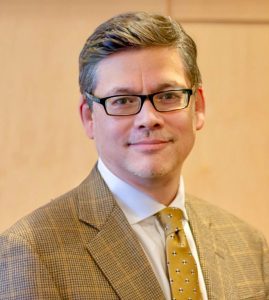
Timothy Rebbeck, Vincent L. Gregory, Jr. Professor of Cancer Prevention at the Harvard Chan School and professor of medical oncology at the Dana-Farber Cancer Institute, was named faculty director of the School’s newly established Center for Global Cancer Prevention on April 2. Rebbeck has directed large molecular epidemiological studies that have helped researchers identify and characterize genes involved in cancer’s causes. His research also focuses on the effects of biological and social factors on prostate cancer disparities and prostate cancer in Africa. Rebbeck serves as associate director for equity and engagement in the Dana-Farber/Harvard Cancer Center and as co-director for the Collective Impact Program of Harvard Catalyst. Read appointment announcement
India Research Center Launches New Website
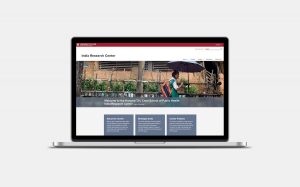 Launched in 2015, the India Research Center facilitates projects by enabling Harvard Chan School faculty and students to connect with Indian collaborators, providing logistical support to research activities and offering fundraising support and office space. The center’s projects include research on improving hospital care and reducing tobacco use, and case studies for the Harvard Chan School’s Doctor of Public Health program. Learn more at the Center’s revamped website, which features expanded descriptions of the Center’s work.
Launched in 2015, the India Research Center facilitates projects by enabling Harvard Chan School faculty and students to connect with Indian collaborators, providing logistical support to research activities and offering fundraising support and office space. The center’s projects include research on improving hospital care and reducing tobacco use, and case studies for the Harvard Chan School’s Doctor of Public Health program. Learn more at the Center’s revamped website, which features expanded descriptions of the Center’s work.
Giving Community Health Leaders the Tools to Spark Change
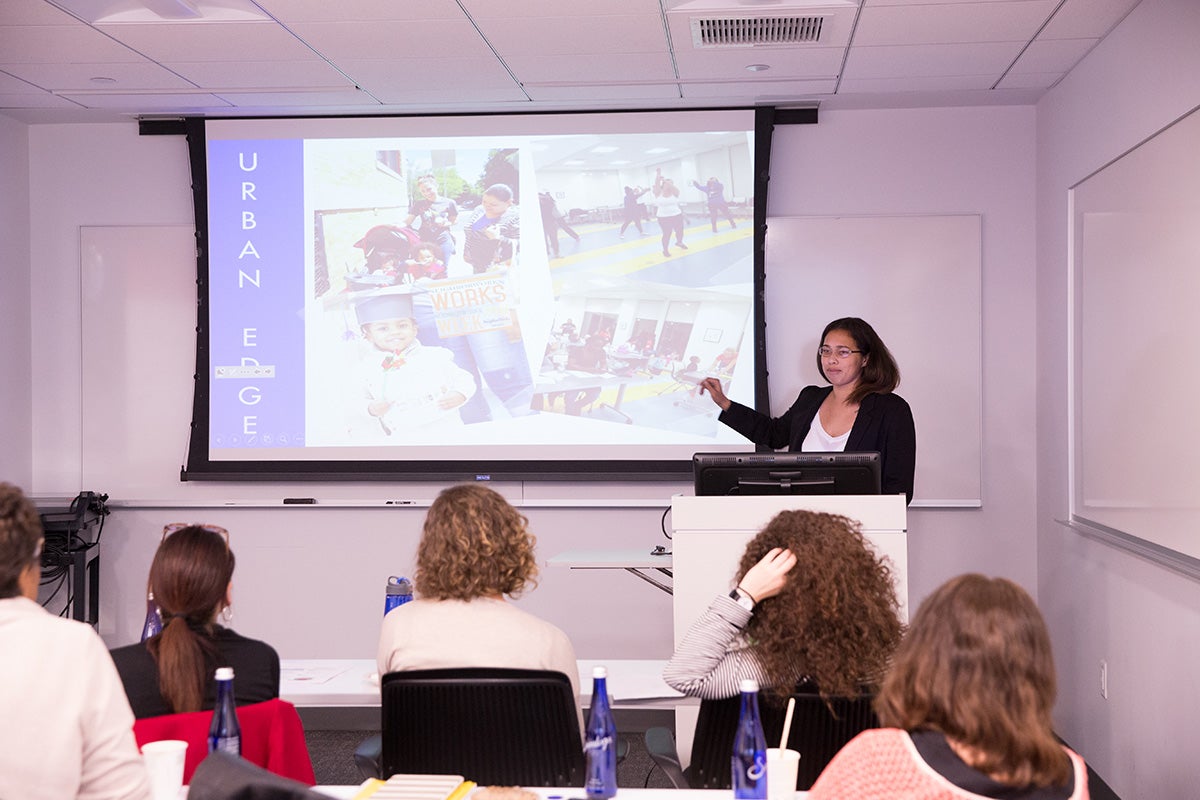
Hunger wasn’t the reason that the young woman came to Sister2Sister—an Action for Boston Community Development program focused on sexual health and relationships. But during a session with a health educator, she shared stories about missed meals. In fact, the issue of food insecurity was coming up often in this office.
So when Irvienne Goldson, deputy director of Action for Boston Community Development Health Services, got the educator’s call asking if it was OK to give the young college student not one, but two of the gift card incentives provided to participants, Goldson agreed without hesitation. She also wondered what more she could do. With food pantries set up to accommodate families, a young woman on her own can fall through the cracks. Meeting her needs would require fresh thinking.
To gain new tools for solving deeply entrenched and often hidden problems, Goldson applied for the Harvard Chan School’s Leaders in Health program. This eight-week course held at the School offers community leaders who practice public health and may lack formal training an introduction to new skills. These may include the basics of community-engaged research and how to strengthen grant proposals with models and diagrams that show how a project’s planned activities lead to an intended result. Throughout the course, participants develop projects inspired by their professional or volunteer work, such as Goldson’s initiative to address food insecurity, a swimming program for Muslim women and girls, and a community coalition to tackle substance abuse.
The aim of the program is to “help people push along an idea or problem they’ve identified in the community and give them the public health tools to address it,” says co-director Rebekka Lee, research scientist in the Department of Social and Behavioral Sciences.
She and Ra’Shaun Nalls, director of community engagement at Harvard Chan, relaunched the program this year, using an expanded curriculum developed by the School’s Prevention Research Center on Nutrition and Physical Activity. They were assisted by Hila Bernstein, MPH ’18, and Lauren Southwick, MPH ’18, who worked with the participants as part of an independent study project.
Goldson says she was energized by the opportunity to step out of her busy routine and explore ideas with peers. She’s already begun setting in motion program changes, like gathering food insecurity data from her clients and developing a referral list for young women who need help finding enough to eat.
—Amy Roeder is associate editor of Harvard Public Health.







